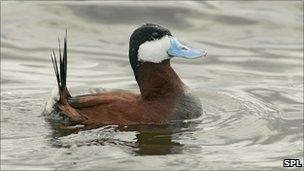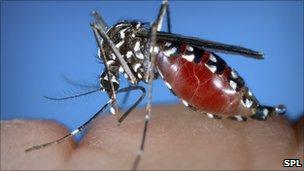Urgent call on EU to stop billion-euro 'alien invasion'
- Published

The Ruddy Duck is just one of more than 1,300 alien species living in Europe which threaten biodiversity.
Leading experts on invasive species are demanding Europe-wide legislation be put in place by next year to tackle the threat to native wildlife.
The researchers want urgent action from the EU to protect Europe's indigenous species from these "alien invaders".
Invasive, non-native animals, plants and microorganisms cause at least 12 billion euros of damage in Europe each year.
The scientists are meeting at the Neobiota conference in Copenhagen.
They are demanding Europe-wide legislation to be in place by next year to ensure the threat doesn't worsen.
Invasive species are defined as those that are introduced accidentally or deliberately into a place where they are not normally found.
A European inventory in 2008 found more than 10,000 alien species in Europe, with 1,300 having some kind of impact. This impact was exerted either on the environment, economy or, on human health.

Water hyacinth grows vigorously and is very expensive to remove from water courses.
And numbers are on the rise. Research published this year in the journal Science found alien species in Europe have increased by 76% in the last 30 years alone.
Piero Genovesi is chair of the Invasive Species Specialist Group (ISSG), a global network of experts on invasive species. He told BBC News that the figure of 12 billion Euros represents a significant underestimate of the impact of alien species.
Huge cost
"For many species we have no idea what damage they cause or their economic impact. This is just a fraction of the actual cost," he told BBC News.
And he added that this estimate does not include any assesment of the economic value of lost biodiversity caused by non-native species.
Scientists gathered at the conference are calling for urgent action by the European Union to implement laws similar to those that already exist in countries like New Zealand and Australia.
"We're asking the EU to rapidly develop and approve a policy on invasive species, fulfilling the formal commitment agreed by the council of European ministers in June 2009," Mr Genovesi told BBC News.
"This is urgent, we would like this to be in place by next year."
Some species introductions have been intentional. The Ruddy duck was introduced to Europe as an ornamental species. It is one of the worst culprits because of its aggressive courting behaviour and willingness to interbreed with endangered, native duck species.
Mr Genovesi, who is also a senior scientist with the ISPRA (The Institute for Environmental Protection and Research) in Italy hopes new legislation will also help prevent non deliberate introductions of species.
"Legislation on aquaculture, for example, would reduce the risks of accidental escapes from fish farms into the environment, he told BBC News.
Human health

The Asian tiger mosquito carries the Chikungunya virus which causes an illness similar to Dengue fever in humans.
As well as the impact on biodiversity and agriculture some species are also a problem for human health.
The Asian Tiger mosquito (Aedes albopictus) originally native to areas of South East Asia has, in the last couple of decades, invaded many countries throughout the world because of increasing international travel and transport of goods.
A. albopictus is one of the 100 worst offenders in Europe according to DAISIE (Delivering Alien Invasive Species Inventories for Europe) an inventory of invasive species in Europe.
It is the vector for Chikungunya fever which, in humans, causes a severe illness which affects the joints and can last for years.
Avian invaders
New research in the journal Biological Conservation has shown that many bird species have an impact on agriculture and human health as far reaching, if not worse, than many mammals.
Wolfgang Nentwig, from the Institute of Ecology and Evolution in Switzerland has just published one of the first detailed studies of the impact of alien birds in Europe.
The Canada Goose (Branta canadensis) was the worst culprit, having the biggest impact on both the environment and economy.
Studies like his and new legislation will, scientists, hope lead to better targeting, eradication and control of non-native, damaging species in Europe.